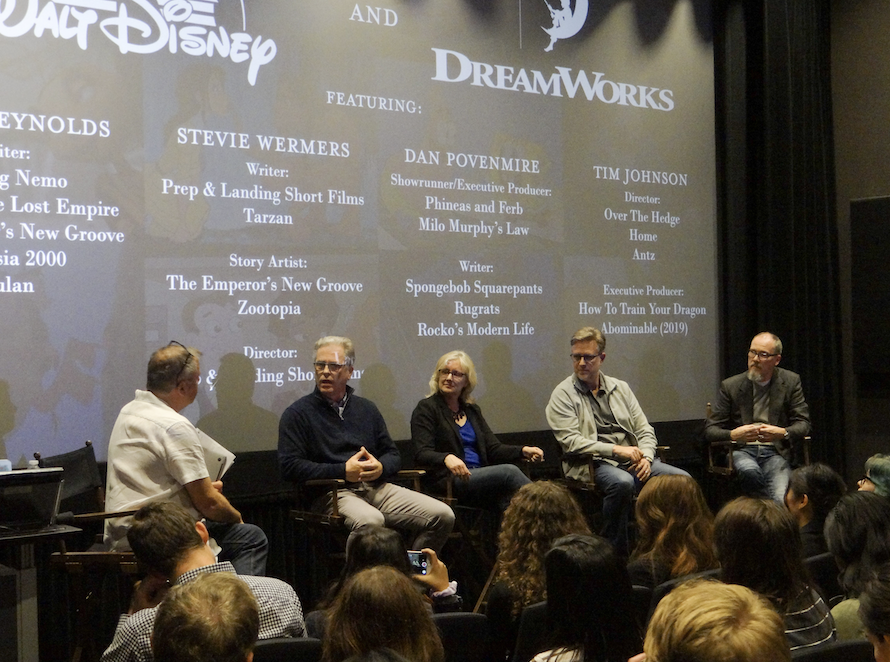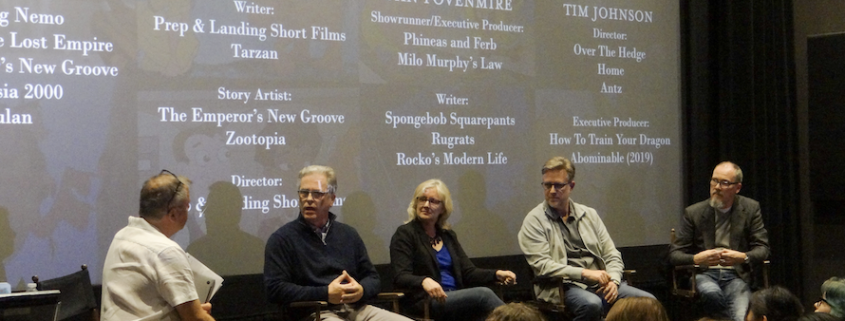Disney and DreamWorks workers discuss animation industry

Nearly 200 students attended a conversation with writers, directors and producers from The Walt Disney Company and DreamWorks Animation about Hollywood’s entertainment and animation industry Monday. The event, hosted by the John Wells Division of Writing for Screen & Television and Film & Television Writers of USC, invited the creators of “Finding Nemo,” “Tarzan” and “Phineas and Ferb” to speak about their creative processes.
The panel included “Finding Nemo” writer David Reynolds, Disney story artist and director Stevie Wermers, “Phineas and Ferb” co-creator Dan Povenmire, and “How to Train Your Dragon” executive producer Tim Johnson. Mary Bronough, president of Film and Television Writers USC, introduced the panel and School of Cinematic Arts screenwriting professor Robert Ramsey moderated.
Ramsey asked Wermers to explain how she started her career in animation and became an Academy Award winning writer and artist for Disney.
“It wasn’t until I saw “Beauty and the Beast” [that I pursued animation],” Wermers said. “I thought this movie was amazing. I didn’t know what I wanted to do with my life. I went to Cal Arts and I talked to one of the counselors there and I applied and they’re like ‘you’re in.’”
Povenmire said that the entertainment industry is unlike any other industry when it comes to the chain of command because executives are involved mostly for the sake of providing entertainment. In other industries, Povenmire explained, executives can be part of a project for years, but in entertainment their expiration date is typically one to two years.
This unique investment in the entertainment value of a creation is key to the animation process, Povenmire continued.
“What you want from your executives is for them to feel ownership of that show,” Povenmire said. “You can’t buy that kind of energy, when they feel like they’re part of this, and it’s their show too.”
Johnson gave advice to audience members looking to start a career in animation. He suggested taking improvisation classes to learn how to think quickly in tough situations.
“My favorite principle of craft comes from improv, which is you never get to say no,” Johnson said. “It’s a great principle for running a brainstorming meeting. It’s a great way to treat executives. It’s a great way to deal with your partner in life.”
During the question and answer session that followed the panel, one student asked for advice on starting a professional screenwriting career.
Povenmire said finding your way into the entertainment industry is an individual path.
“No one can tell you how to get your first gig,” Povenmire said. “They can only tell you how they got their gig-collect enough of those and you’ll have a road map.”
Rose Bueno, a junior majoring in cinema and media studies, said the final remark by Povenmire stood out to her.
“It was particularly impactful to hear, especially at the end, their closing remarks about getting your first start in the industry and that there is no clear path,” Bueno said. “It’s a testament that people will get to where they need to if they’re determined.”

